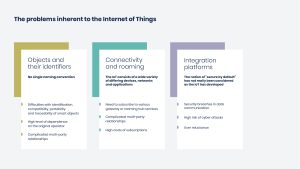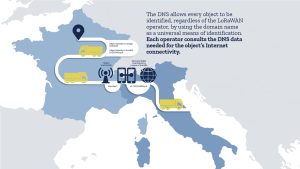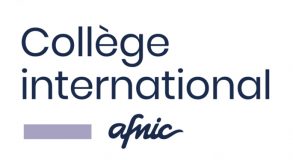The Internet of Things (IoT) market is expanding rapidly worldwide. However, it is difficult to envisage it truly scaling up owing to a lack of interoperability across IoT solutions, potential security flaws in these new smart objects, and the immaturity of certain devices.
As an expert in the DNS protocol, combined with more than 13 years of research and development into subjects and projects relating to the Internet of Things, Afnic has developed a naming service unique to the IoT, able to meet the challenges of ensuring uniformity in objects and networks, and their security requirements.
The Internet of Things, a disparate market showing interoperability and security shortcomings
The IoT is currently based on a number of standards. New emerging technologies have been developed in such a way as to meet the specific requirements of individual market segments, and several naming conventions co-exist. For operators and networks, the outcome is considerable difficulties in recognising and managing smart objects.
Most of these technologies are not interoperable, working as they do in silos, not across the entire IoT. This entails the use of costly third-party services, making the relationships between objects more complicated and increasing the risk of cyber attacks.
-
The problems inherent to the Internet of Things
Objects and their identifiers
No single naming convention- Difficulties with identification, compatibility, portability and traceability of smart objects
- High level of dependence on the original operator
- Complicated multi-party relationships
Connectivity and roaming
The IoT consists of a wide variety of differing devices, networks and applications- Need to subscribe to various gateway or roaming hub services.
- Complicated multi-party relationships
- High costs of subscriptions
Integration platforms
The notion of “secure by default” has not really been considered as the IoT has developed- Security breaches in data communication
- High risk of cyber attacks
- User reluctance
While designers and manufacturers of smart objects have control over the data their products send out, this data is isolated and of little value if not connected with other data from third-party smart objects. There is a genuine threat of seeing the IT giants […] grab control of data from connected services by making their technology (the operating system, software, voice assistants, etc.) the market standard(s).
-
The single naming system for smart object identifiers: Afnic’s response to IoT interoperability and security issues
Your objects
Assigning of a permanent, universal identifierYour network
Identification of an object regardless of the operatorYour platform
Verification of the legitimacy of object/network requests- Standardised identification of connected objects using DNS technology ensures the portability of all of your IoT smart objects at no extra cost.
- Systematic checks on objects’ network connections using the DNS gateway and the DNSSEC service which strengthens security for all of your smart objects.
Independence
Trust
Traceability
Interoperability
Ease of use
-
Data loss on journeys where roaming is needed. The object identifier is recognised by the French operator but not by the Italian operator.
Journey in France
The lorry fitted with a connected device travels within France with its identifier recognised by the operator/supplier.Object connection
Identifier recognised
The device connects to the LoRa France network via its LoRaWAN operator package taken out in France.Crossing into Italy
Identifier unknown
No roaming = no communication gateway: the device is unable to connect to the network because its identifier is not recognised by the Italian operator on the LoRaWAN.Identifier recognised
Roaming = communication gateway: the device can connect to the network thanks to the roaming contract taken out.A roaming contract adds an average of €12 per annum per object.
-
The DNS allows every object to be identified, regardless of the LoRaWAN operator, by using the domain name as a universal means of identification. Each operator consults the DNS data needed for the object’s Internet connectivity.
Object identity by design:
Object identity in the DNS:
Object connection
Identifier?
Interoperability maintained by means of the DNS
Afnic, a key player in cooperative IoT innovation based on the DNS and its applications
Afnic’s R&D teams (accounting for 10% of our total headcount) have been heavily involved in innovative work in connection with the Internet of Things for more than 13 years. Run with public- and private-sector partners, the aim of these projects is to devise and deploy tomorrow’s IoT standards and usages, while providing answers to key business issues by providing added value.
- Started in 2019 and run in conjunction with a number of stakeholders from industry and academia, the aim of the DiNS project is to dismantle the IoT’s network silos and enable smart objects’ interoperability using the DNS protocol. This was the background to the deployment by Afnic engineers and researchers of IoTRoam, an infrastructure based on DNS and its security extensions, allowing a secure roaming service to be provided between different IoT networks.
More information about the DiNS project - PIVOT is a Franco-German research project aiming to include confidentiality and security as components in the Internet of Things by using privacy-compliant identifiers based on existing DNS infrastructure. To deploy a protection ecosystem, PIVOT is using Europe’s main operating system for the IoT: RIOT.
A bespoke solution for 360° support
Our DNS experts and our Partnerships and Innovation team offer a comprehensive bespoke support service covering all aspects of your IoT project, including assessing the benefit of your plans on the basis of your brand positioning or the dynamism of your community, support in building the organisation and roadmap best-suited to optimum roll-out of your project, and so on.
Please contact us for further information.







